Affiliate links on Android Authority may earn us a commission. Learn more.
OnePlus 9 Pro vs Samsung Galaxy S21 Ultra: Which should you buy?
Published onApril 10, 2021
Today’s premium flagship market is incredibly dense. Among the manufacturers struggling to stand out from each other, two of the game’s biggest players are vying for supremacy. The OnePlus 9 Pro and the Samsung Galaxy S21 Ultra offer similar experiences at similar prices. While one continues to dominate in the photography field, the other relies on raw performance and software to get the job done. Are there enough differences to make them stand out from each other? Find out in Android Authority’s OnePlus 9 Pro vs Samsung Galaxy S21 Ultra hands-on comparison.
If you’re after a look at how the OnePlus 9 and OnePlus 9 Pro compare with the wider Galaxy S21 family, be sure to check out our series comparison.
Our verdict: OnePlus 9 Pro review | Samsung Galaxy S21 Ultra review
OnePlus 9 Pro vs Samsung Galaxy S21 Ultra specs
| OnePlus 9 Pro | Samsung Galaxy S21 Ultra | |
|---|---|---|
Display | OnePlus 9 Pro 6.7-inch curved LTPO AMOLED 20.1:9 aspect ratio 3,216 x 1,440 at 525ppi 120Hz refresh rate (adaptive) | Samsung Galaxy S21 Ultra 6.8-inch Dynamic AMOLED Curved WQHD+ 3,200 x 1,440 at 515ppi Adaptive 120Hz refresh rate |
Processor | OnePlus 9 Pro Qualcomm Snapdragon 888 | Samsung Galaxy S21 Ultra Qualcomm Snapdragon 888 or Samsung Exynos 2100 |
RAM | OnePlus 9 Pro 8 or 12GB | Samsung Galaxy S21 Ultra 12 or 16GB |
Storage | OnePlus 9 Pro 128 or 256GB No external storage | Samsung Galaxy S21 Ultra 128, 256, or 512GB No external storage |
Power | OnePlus 9 Pro 4,500mAh battery Warp Charge 65T 65W charger in box Warp Charge 50 Wireless 10V/6.5A, 20V/3.25A Output: 50W (with prop. charging stand) | Samsung Galaxy S21 Ultra 5,000mAh battery Fast wired and wireless charging |
Connectivity | OnePlus 9 Pro 5G support Wi-Fi 6 support 2x2 MIMO Wi-Fi 802.11 a/b/g/n/ac/ax NFC support Bluetooth 5.2 | Samsung Galaxy S21 Ultra 5G support Wi-Fi 6E support NFC support Bluetooth 5.0 |
Cameras | OnePlus 9 Pro Rear: - 48MP main (Sony IMX789) 1/1.43-inch sensor 1.12μm/46MP or 2.24μm/12MP ƒ/1.8, EIS, OIS - 50MP ultra-wide (Sony IMX766) 1/1.56-inch sensor ƒ/2.2 - 8MP telephoto 1.0μm, ƒ/2.4 - 2MP monochrome Front: - 16MP single (Sony IMX471) 1.0μm with EIS ƒ/2.4, fixed focus | Samsung Galaxy S21 Ultra Rear: - Wide-angle: 108MP, ƒ/1.8, 0.8µm with OIS and phase-detection AF - Telephoto: 10MP, ƒ/2.4, 1.22µm with OIS, dual-pixel AF, and 3x optical zoom - Telephoto: 10MP, ƒ/4.9, 1.22µm with OIS, dual-pixel AF, and 10x optical zoom - Ultra-wide: 12MP, ƒ/2.2, 1.4µm with dual-pixel AF and a 120-degree FoV - Laser AF sensor 10x optical zoom 100x "Space Zoom" Front: - 40MP, ƒ/2.2, 0.7µm, with phase-detection AF |
Software | OnePlus 9 Pro Android 11 Oxygen OS 11 | Samsung Galaxy S21 Ultra Android 11 One UI 3.1 |
Dimensions and weight | OnePlus 9 Pro Global: 163.2 x 73.6 x 8.7mm 197g | Samsung Galaxy S21 Ultra 75.6 x 165.1 x 8.9mm 229g |
Colors | OnePlus 9 Pro Morning Mist, Forest Green, Stellar Black | Samsung Galaxy S21 Ultra 128 GB in Phantom Silver and Phantom Black 256 and 512GB in Phantom Black Other colors: Phantom Titanium, Phantom Navy, and Phantom Brown |
Design and display
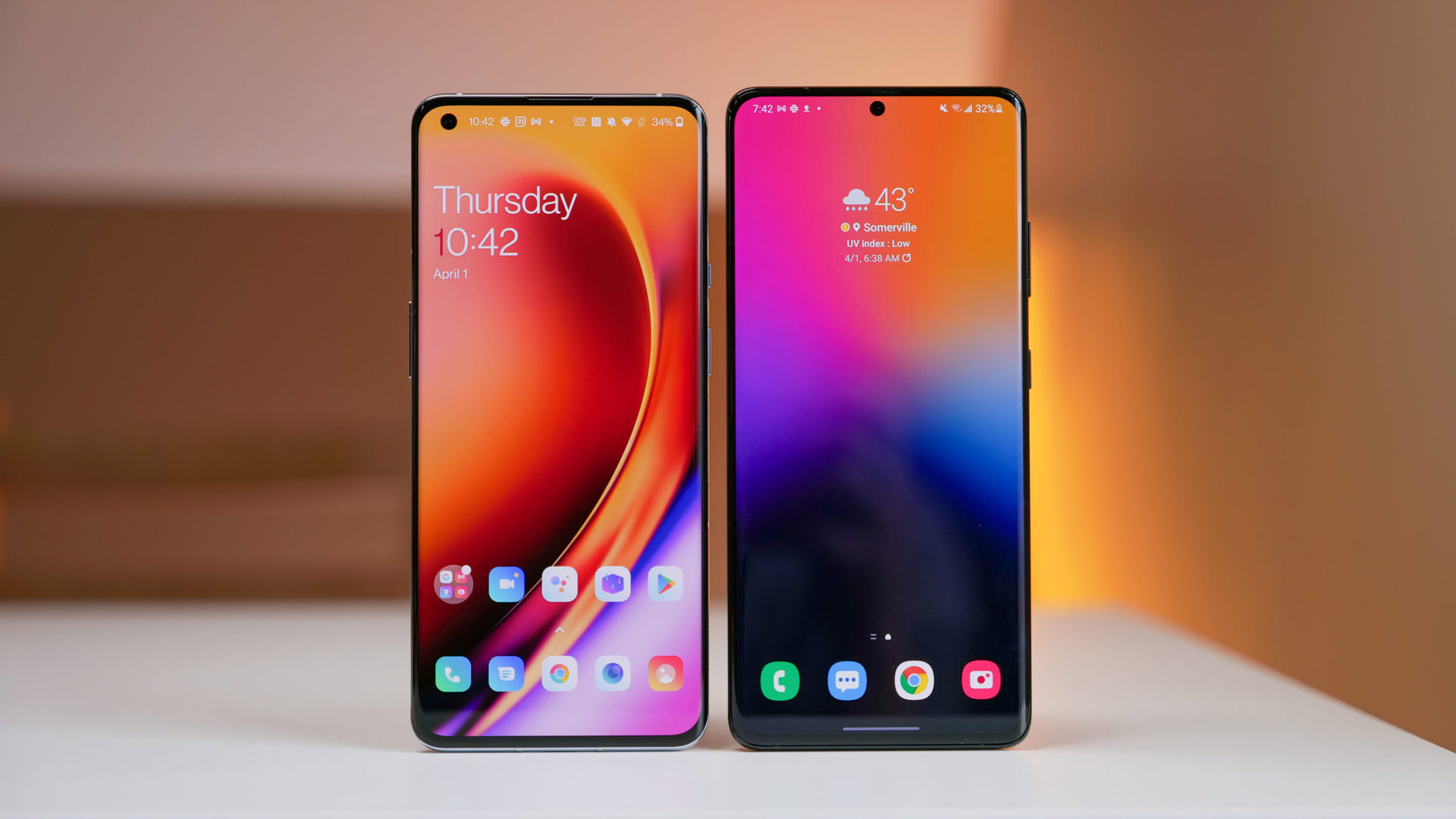
The designs of these two phones couldn’t be more different. The Samsung Galaxy S21 Ultra is heavier, has a matte finish across all colorways, and a larger camera bump. Both the body and display are protected by the latest Gorilla Glass Victus, and the phone has an IP68 rating for water and dust resistance. The “Contour Cut” design of the camera feels intentional and looks very dramatic in person. While the phone is gigantic, it doesn’t feel overwhelming, and the overall weight gives a premium impression in the hand.
See also: The best Samsung Galaxy S21 Ultra cases
Comparatively, the OnePlus 9 Pro is slimmer, has a glossy finish (unless you grab the matte Stellar Black or Forest Green model), a smaller camera bump, and an alert slider. The body and display are made up of Gorilla Glass 5, and while there is IP68 water and dust resistance rating, the device feels cheaper. In part, this is due to the glossy finish and lighter weight of the phone, but I also prefer the camera design on the S21 Ultra. While smaller, the OnePlus 9 Pro’s camera module feels more of an afterthought than a staple of the device.
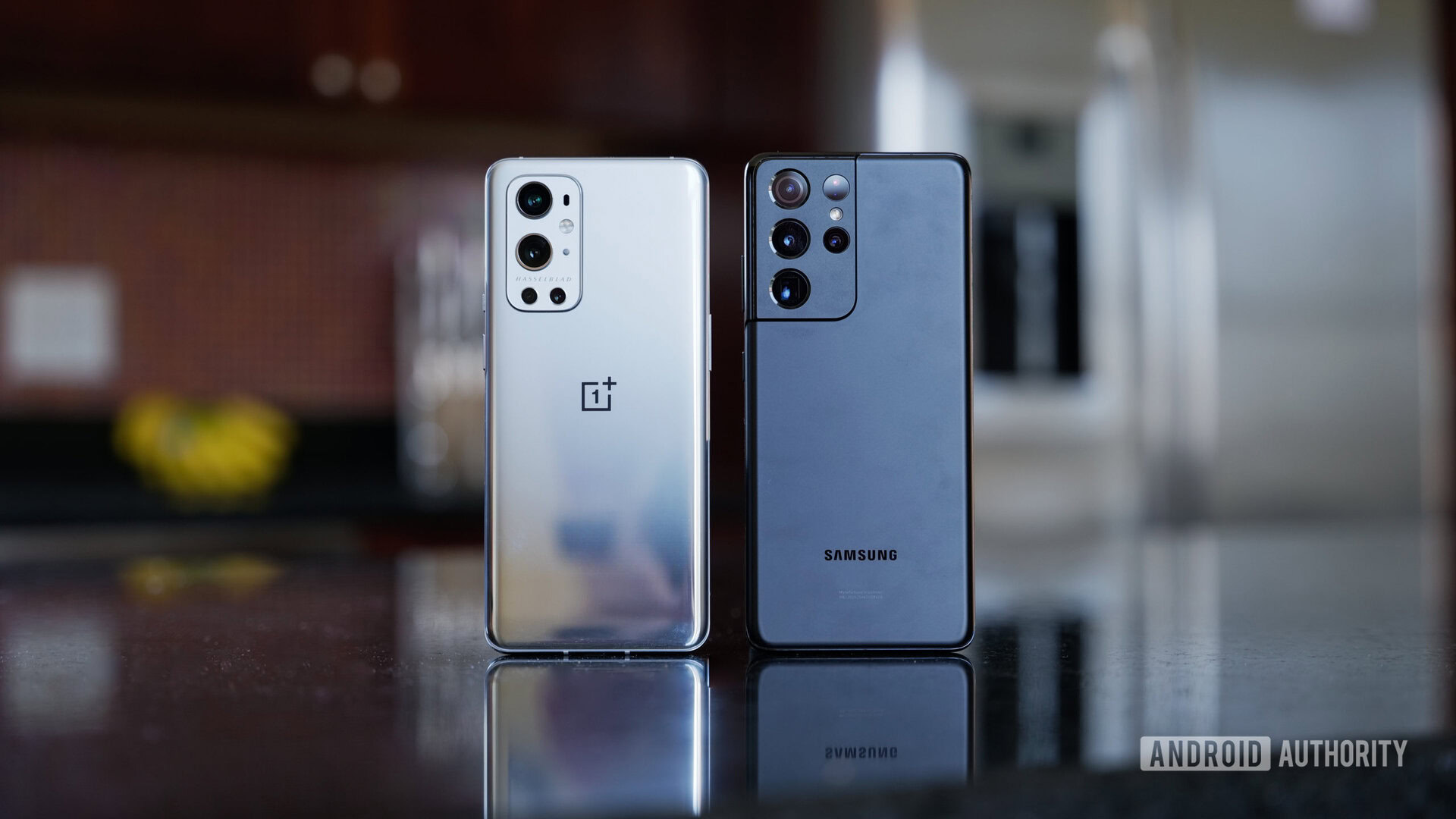
The location of the USB-C port, stereo speakers, and SIM card tray is in almost identical locations. However, the volume rocker is located on the left side of the OnePlus 9 Pro, as opposed to the right on the Galaxy S21 Ultra. I would give the S21 Ultra a slight edge here, as the button presses are slightly more tactile. Haptics on both of these devices are good, but the OnePlus 9 Pro comes away with a narrow win — vibrations are more precise and nuanced than those on the S21 Ultra.
The Samsung Galaxy S21 Ultra feels more premium in the hand.
Both of these displays are impressive in their own right, with each featuring a QHD+ resolution screen, 120Hz adaptive refresh rate, and a punch hole cutout for the camera. I will admit that I prefer the front camera’s location on the OnePlus 9 Pro; that said, the S21 Ultra has a smaller cutout. Also, the Ultra’s display is slightly larger, coming in at 6.81-inches compared to the 6.7-inches of the 9 Pro. Comparing the displays side by side, I couldn’t recognize any perceivable differences in resolution or color. The display on the S21 Ultra is slightly less curved than the 9 Pro, but not to any meaningful degree.
Battery life
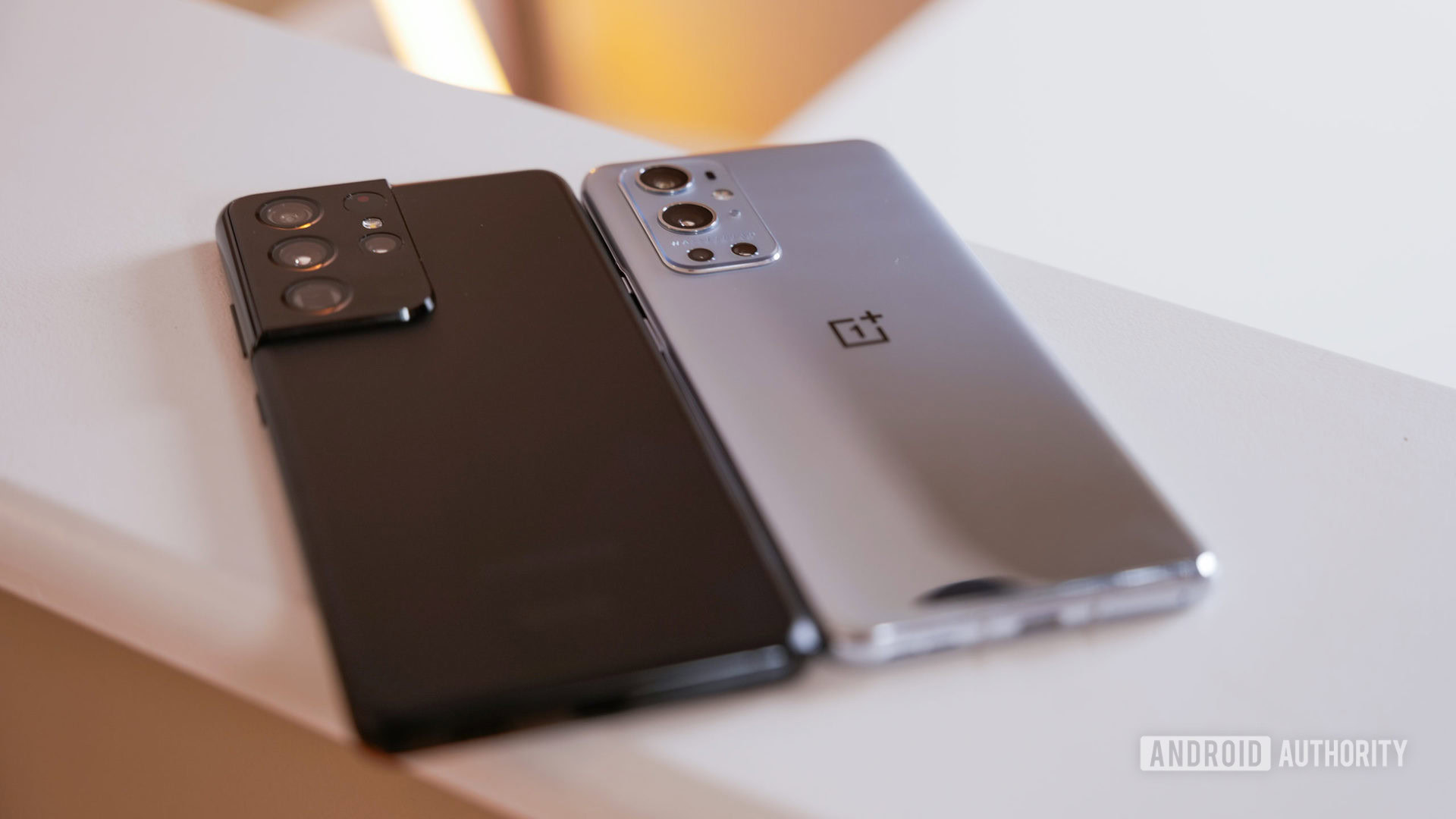
Unsurprisingly, these large devices have large batteries. The Samsung Galaxy ships with a 5,000mAh cell, whereas the OnePlus 9 Pro ships with a 4500mAh battery. On paper, this 500mAh difference doesn’t sound like much, but it’s a different story in real life. In the stock configuration (Full HD+ at adaptive 120Hz), the OnePlus 9 Pro makes it through just about a full day. In my testing, it usually needed a recharge at around 10PM. On the other hand, the S21 Ultra (again set to FHD + and dynamic 120Hz) can make it through almost two days, with about 15% left towards the end of the second day. The S21 Ultra destroys the OnePlus 9 Pro when it comes to battery life performance.
The S21 Ultra destroys the OnePlus 9 Pro when it comes to battery life performance, but OnePlus' rapid charging smashes Samsung.
However, where the OnePlus has the S21 Ultra beat is in charging speeds. The 9 Pro comes with a 65W fast charger in the box, but the Galaxy S21 Ultra doesn’t come with any kind of bundled charger. This alone could be a deciding factor. However, the advantages for OnePlus don’t stop here. The 9 Pro charges at an incredible rate of 65W, which takes the phone from zero to 75% in just under 20 minutes. By comparison, the Galaxy S21 Ultra only charges at a rate of 25W, making for significantly longer charging times.
Again, the 9 Pro comes away with a significant win when it comes to wireless charging performance. With OnePlus’s first-party 50W wireless charger, the 9 Pro can power up from 0% to 70% in just 30 minutes. Even with Samsung’s first-party wireless charger, the S21 Ultra can only charge at a rate of 15W wirelessly.
It’s interesting to see two sides of very different charging ideologies. Samsung chose the route of longer raw battery life, whereas OnePlus seems content with offering shorter battery life in exchange for faster charging. Unfortunately, whichever device you choose will come with a trade-off.
Performance and UI
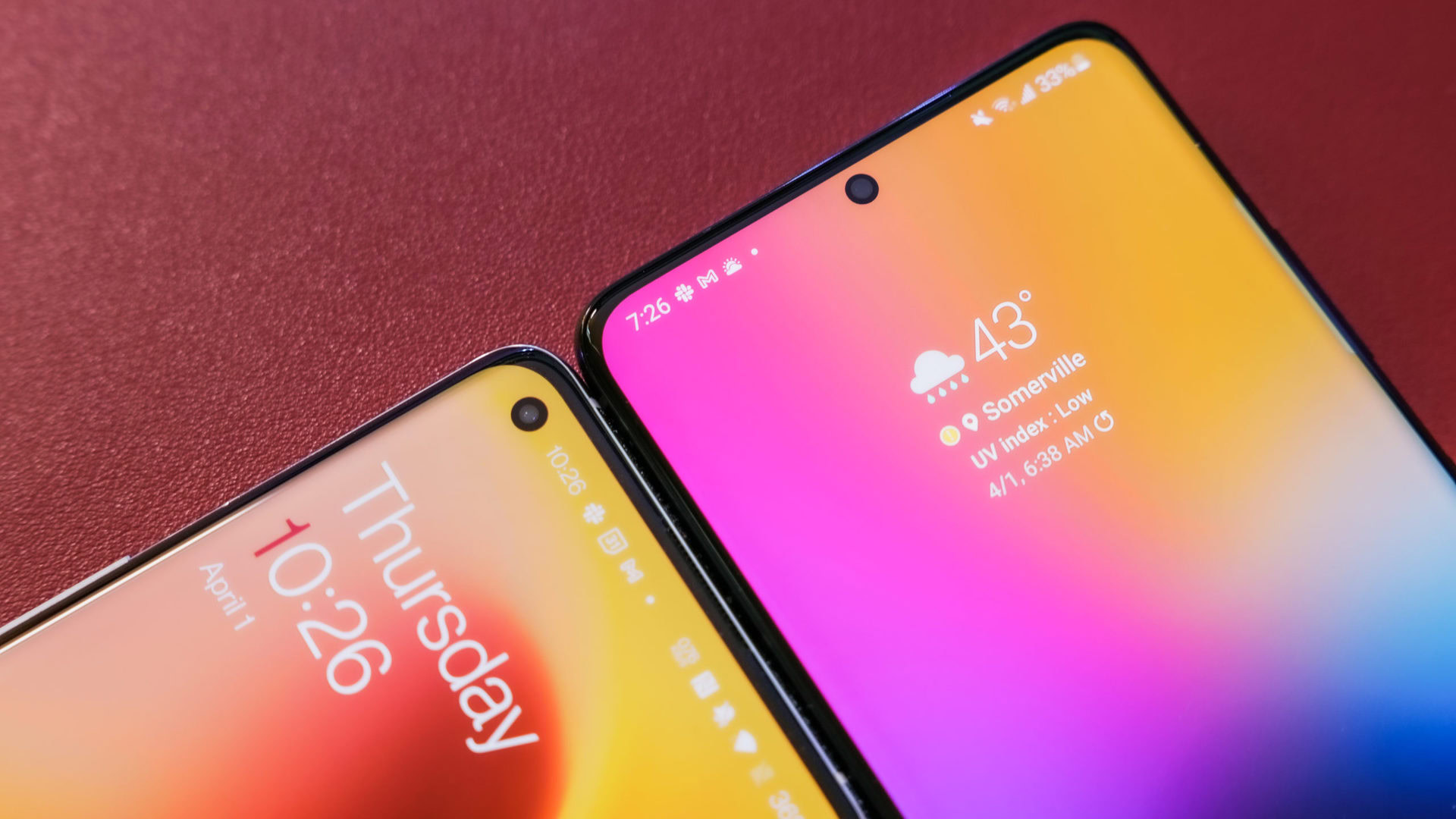
Raw power on the Galaxy S21 Ultra and OnePlus 9 Pro is nearly identical, as both phones ship with the latest Snapdragon 888 processor. The 9 Pro has options of 8GB and 12GB of RAM, while the S21 Ultra starts with a base of 12GB, going up to a whopping 16GB for the top model. In our tests, the Galaxy S21 Ultra scored 5,022 in Geekbench 4 single-core and 13,915 in multi-core. By comparison, the OnePlus 9 Pro scored 5,036 and 14,371, respectively. We also ran our custom Speed Test G benchmark and the 9 Pro came away with a narrow win on the timed test clocking in at one minute 15 seconds, compared to the S21 Ultra’s one minute 19 seconds. What this means for your day-to-day is that both phones will provide a smooth experience across the board. Yes, the 9 Pro is technically more powerful than the Galaxy S21 Ultra, but users will not experience this marginal difference in speed.
It should also be noted that the Galaxy S21 Ultra sold in Europe and other regions outside of the US packs an Exynos 2100 chipset instead of the Snapdragon. While it’s still a competitive SoC, it’s not quite as powerful as Qualcomm’s processor, especially in the GPU department. You can read more about the differences in the article linked below.
Deep dive: Samsung Galaxy S21 Ultra Snapdragon vs Exynos: How big is the performance gap?
Gaming is no different, with both phones performing impressively in their own right. I didn’t notice any significant difference in games such as PUBG Mobile or Asphalt 9. The adaptive 120Hz comes to bat in both devices, as gaming at 60fps was smooth with no noticeable hangs or stutters. I will say the 9 Pro remained slightly cooler to the touch when gaming for more extended periods, but again the difference is negligible.
Another considerable difference is the user interface. Both devices run Android 11 but ship with different skins. The OnePlus 9 Pro runs Oxygen OS 11, which I found far cleaner than One UI 3 that runs on the Samsung Galaxy S21 Ultra. This may come as a surprise to some, but the 9 Pro also ships with less bloatware than the Galaxy S21 Ultra. Aesthetic differences aside, functionality on both skins remains almost the same. Strictly from a user standpoint, I might add that Oxygen OS is slightly more easy to navigate, but again, this is my personal opinion. Finding settings is simple and both default launchers feature native Google integration with the Google Discover feed on the left-most homescreen. You can read more on the differences between Oxygen OS and One UI in our deep dive linked above.
Camera
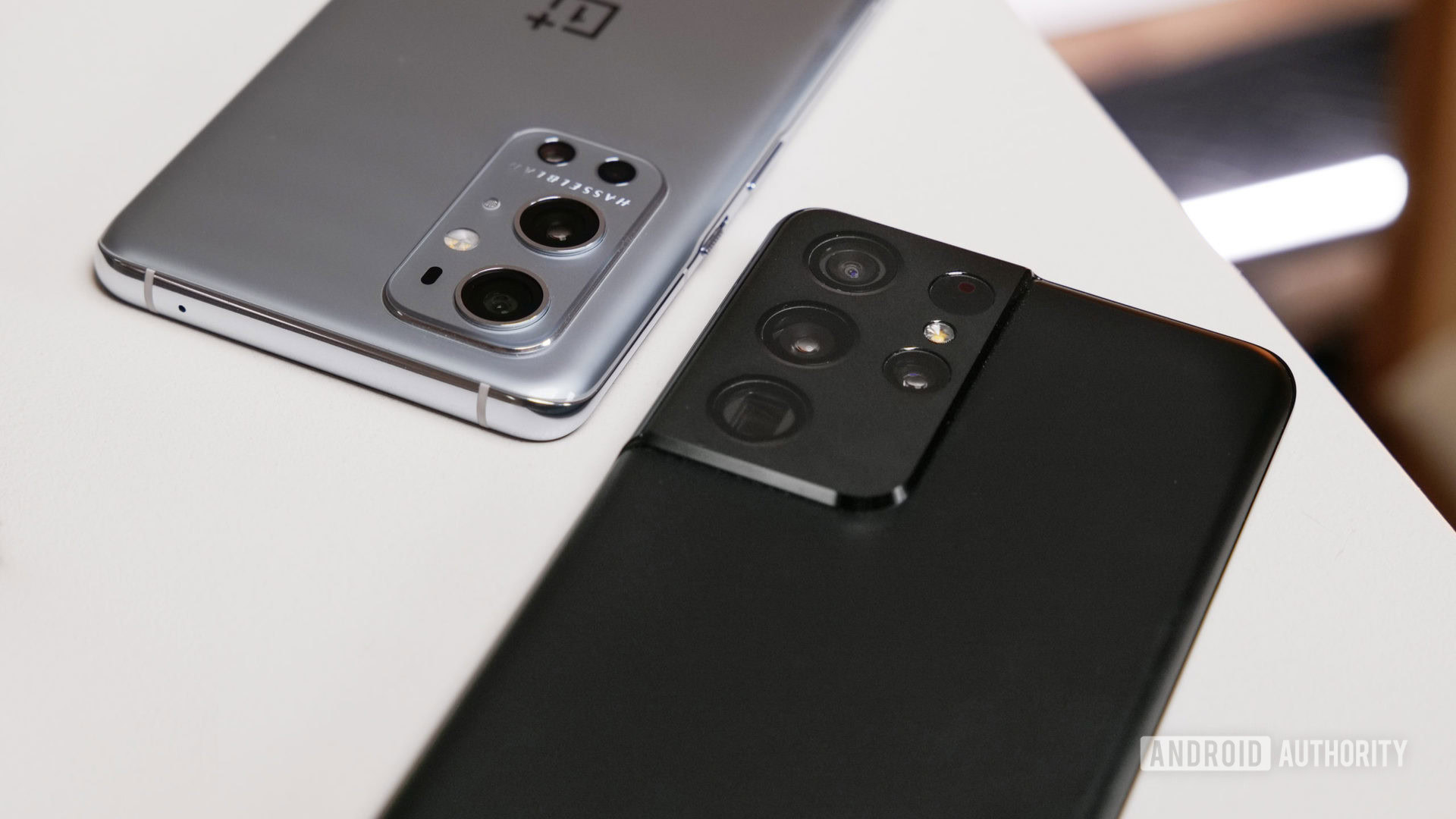
Cameras have traditionally been OnePlus’ Achilles heel with Samsung taking an easy win in any Vs match-ups. However, this time around, it’s closer than ever. OnePlus partnered with Hasselblad in an attempt to fix some of its long-lasting camera issues. This new change has proven to be pretty successful, but as you’ll find out, the Samsung Galaxy 21 Ultra performs slightly better than OnePlus 9 Pro in most metrics.
Related: The best camera phones
Both of these devices handle dynamic range, white balance, detail, and color well. However, the OnePlus 9 Pro seems to produce slightly more detailed images compared to the Galaxy S21 Ultra. On paper, you might think the S21 Ultra would beat out the 9 Pro due to its larger 108MP wide-angle camera. In comparison, the OnePlus 9 Pro uses a 48MP primary camera. However, both produce 12MP images by default (due to pixel binning), and the result shows very comparable detail capture. Like I’ve said before, specs don’t mean everything, and the 9 Pro is an excellent example of this. That said, I think the difference comes down to software processing. The 9 Pro does tend to over sharpen images giving the effect of a more detailed photo, whereas the Galaxy S21 Ultra’s detail is on par, but the software processing oversoftens the image. Regardless, this is the closest we’ve seen OnePlus get when it comes to camera performance.
The S21 Ultra still produces more saturated, punchy photos and brighter photos. Like we mentioned in our full review, thanks to the partnership with Hasselblad, OnePlus has improved its color processing this generation, which errs on the side of realism. The images produced are flatter with less contrast and saturation. Some might see this as a downside, but it gives you some added flexibility to edit the photos in post. I did prefer the overall look of the S21 Ultra’s color science over the 9 Pro, but this will come down to personal preference. If you like punchier, brighter images, then the Galaxy S21 Ultra might be the camera phone for you.
HDR performance on the OnePlus 9 Pro is not as good compared to the Galaxy S21 Ultra. In most cases, the S21 Ultra retains more details in the shadows and highlights, making for a slightly more natural-looking HDR image. This is especially seen in lower-light indoor photos, as the 9 Pro produces some oversaturated scenes. Even still, in daylight scenarios, the 9 Pro competes but tends to reduce the highlights and lift the shadows a little more. The resulting image is a little flatter than the S21 Ultra but not at all unpleasant.
The wide-angle lenses on both of these phones are good. The S21 Ultra does tend to produce a slightly sharper and higher dynamic range photo. It also creates a more accurate white balance, and images are brighter and more saturated. The Galaxy S21 takes the win here, but by a slim margin.
Finally, the telephoto and selfie cameras are both very close, but again, the Galaxy S21 Ultra produces brighter, sharper, and less noisy images. This is especially significant in the telephoto lens considering that the S21 Ultra is capable of 10x optical zoom, compared to OnePlus’s 3x. Still, even at 3x the S21 Ultra produces far sharper and cleaner images.
In general, the Samsung Galaxy S21 Ultra performs better in low light. Dynamic range and white balance are slightly more accurate vs the OnePlus 9 Pro. That said, again the 9 Pro seems to retain more detail in the highlights and shadows. Both devices produce incredibly close images in low light, but I still preferred the more saturated images coming out of the S21 Ultra.
If you would like to see the full resolution camera samples, they can be found here in Google Drive folders here and here.
More camera shootouts:
- Camera shootout: Samsung Galaxy S21 Ultra vs Apple iPhone 12 Pro Max
- Camera shootout: Samsung Galaxy S21 Ultra vs Google Pixel 5
- Camera shootout: Samsung Galaxy S21 Ultra vs HUAWEI P40 Pro Plus
Price
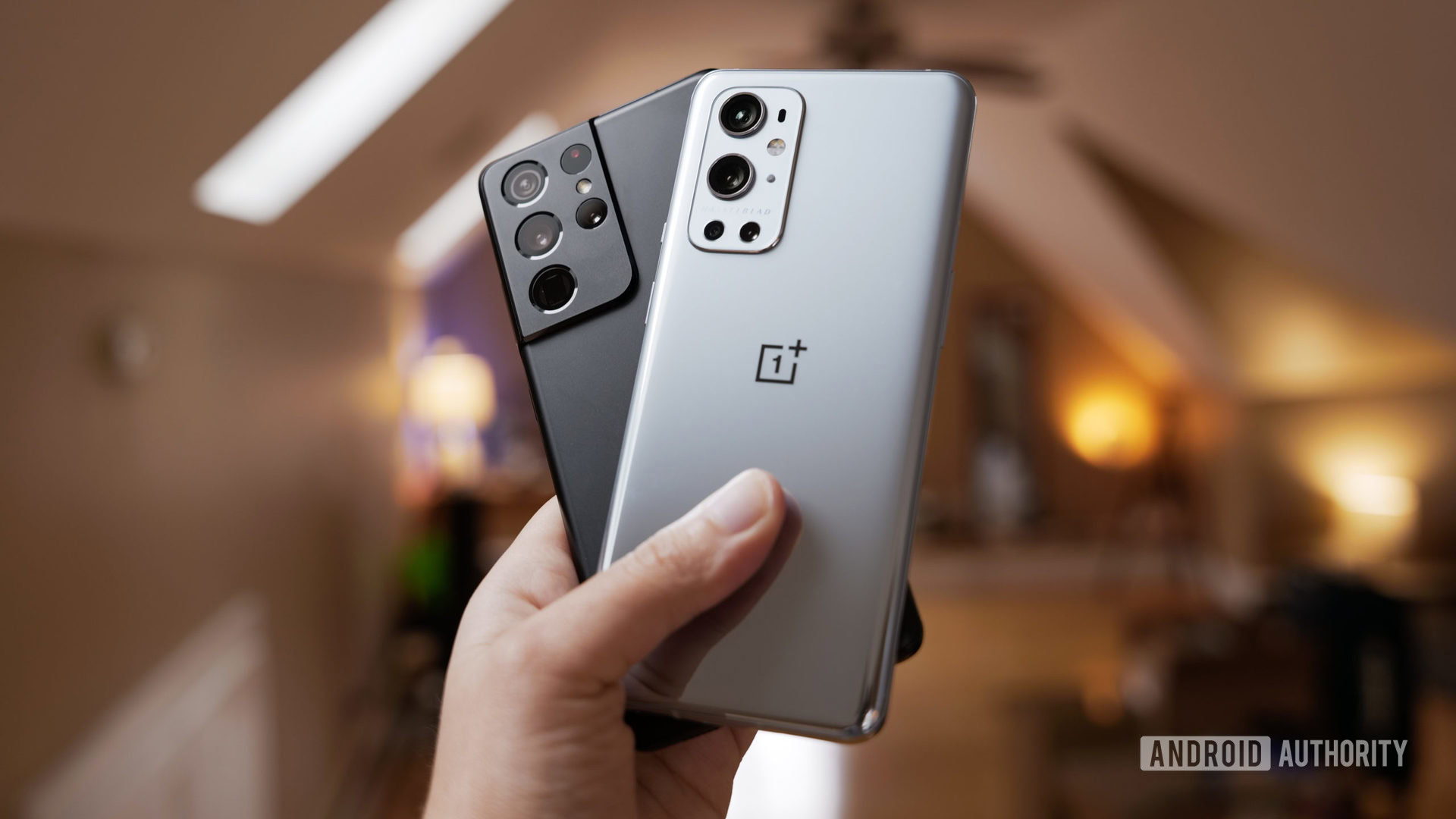
In the US, the OnePlus 9 Pro starts at a base price of $969 for the 8GB RAM/128GB of storage option. If you want to move up to the 12GB RAM/256GB model, that brings up the price to $1,069.
- OnePlus 9 Pro with 8GB RAM+128GB storage: $969/£829/€919/64,999 rupees
- OnePlus 9 Pro with 12GB RAM+256GB storage: $1069/£929/€999/69,999 rupees
The Samsung Galaxy S21 Ultra starts at $1,199 for the 12GB RAM/128GB of storage. Prices go up in $50 increments if you want the higher tier options.
- Samsung Galaxy S21 Ultra with 12GB RAM+128GB storage: $1,199/£1,149/€1,249
- Samsung Galaxy S21 Ultra with 12GB RAM+256GB storage: $1,249/£1,199/€1,299/128,999 rupees
- Samsung Galaxy S21 Ultra with 16GB RAM+512GB storage: $1,379/£1,329/€1,429/139,999 rupees
OnePlus 9 Pro vs Samsung Galaxy S21 Ultra: The verdict
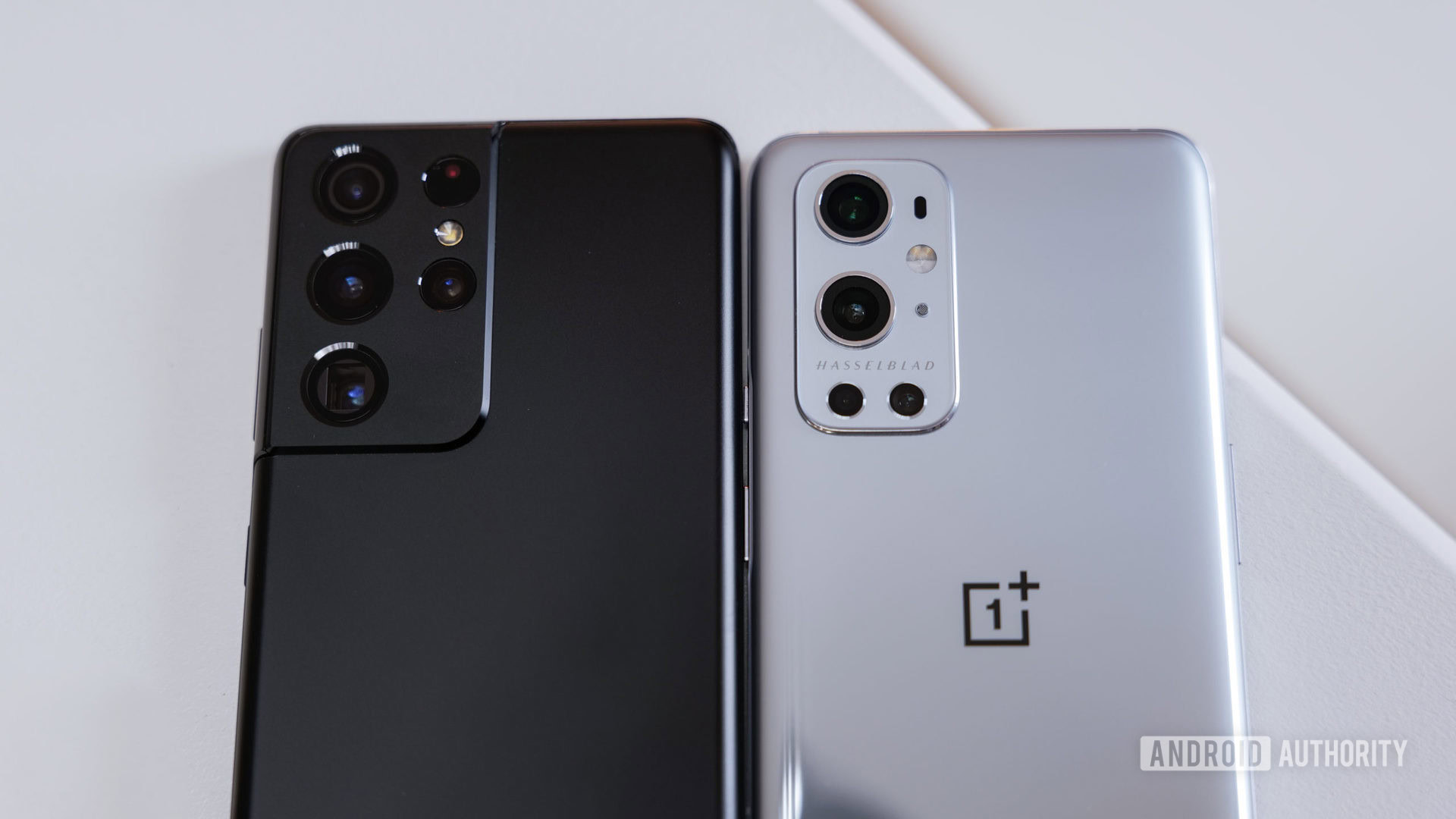
Both devices are incredibly good. The specs compete on paper and in real life, which means choosing one of these premium flagships over the other has never been so difficult. Moreover, the main cameras on both of these devices perform so closely that I don’t believe it a metric to chose one over the other. That said, the Samsung Galaxy S21 Ultra provides a more premium experience, both in design and battery life, albeit at a much higher MSRP. For power users with money to spare, the extra flexibility of the longer battery life may be a deciding factor.
Related: The best OnePlus 9 alternatives — 7 phones to check out before you buy
On the other hand, the OnePlus 9 Pro has crazy fast charging times, a minimal design, and competitive cameras — all for $200 less for the base model. As a result, budget-minded consumers might find the OnePlus 9 Pro more attractive.
Bottom line, if you want a smoother UI and incredibly fast charging times, go with the OnePlus 9 Pro, but if longer battery life, overall camera versatility, and a more premium design is your cup of tea, the Galaxy S21 Ultra is the clear choice to go with.